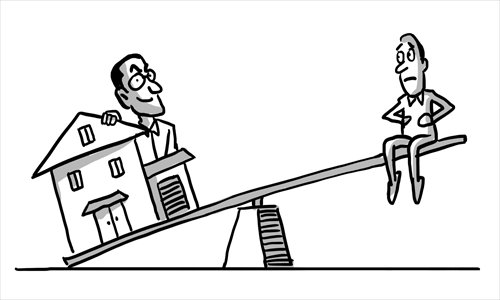
Illustration: Liu Rui/GT
While ordinary workers complain that the rise of their income cannot rival inflation, the property and automobile markets have been flourishing. While statistics show the average salary of Chinese staff lags behind comparable nations and regions, the Chinese have been leading global luxury consumption. Behind this contrast is China's "invisible welfare."
Around the time of China's accession to the WTO, reforms on SOEs were carried out under the banner of "(the state) seizing the big (SOEs) and releasing the small (SOEs)." But these reforms remain stagnant. In response to the looming global economic crisis, the power of the "invisible hand" has been discredited, thus the government tends to revisit its conventional wisdom of excessive interference with the economy.
Besides government offices, SOEs are the top job choices for college graduates. In addition to job security and monopolistic power, fringe benefits, including housing, are among those prime motivations. Then the question voiced by the public is that such lucrative package for those SOEs employees is not based on the organization's market competitiveness, but rather on their monopolistic position and the leniency of the government.
A colossal rice bowl is needed to feed more than 6 million public servants. "Low wages with high perks" have been the secret recipe to attract smart people into officialdom.
Let's have a reality check. Under the current transformative social framework, neither the Confucian style of moral cultivation, nor political brainwashing is a reliable way to rein the behavior of government officials and SOE officers. With power vested in loosely checked hands, everyone can be a candidate for corruption. For an equitable China, a decisive institutional reform has to downsize the government, contain its role in resource allocation and improve its transparency. To demolish the unfair advantage of those privileged groups already in clusters, much depends on the vision, courage and innovativeness of the government.
The article was compiled by Global Times reporter Wang Wenwen based on an interview with Liu Baocheng, director of the Center for International Business Ethics at the University of International Business and Economics. wangwenwen@globaltimes.com.cn
More information, please visit: http://www.globaltimes.cn/content/790198.shtml#.UcKSiNhbzlU
|
